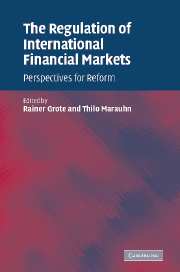Book contents
- Frontmatter
- Contents
- Notes on contributors
- Preface
- List of abbreviations
- Introduction: the regulatory dilemma in international financial relations
- PART I An historical perspective
- PART II A comparative perspective
- PART III A public international law perspective
- PART IV An institutional perspective
- 9 The European Central Bank as regulator and as institutional actor
- 10 The Basle Committee on Banking Supervision – a secretive club of giants?
- 11 Strengthening the international financial architecture: contribution by the IMF and World Bank
- PART V A policy perspective
- Conclusions and agenda for further research
- Index
10 - The Basle Committee on Banking Supervision – a secretive club of giants?
Published online by Cambridge University Press: 08 July 2009
- Frontmatter
- Contents
- Notes on contributors
- Preface
- List of abbreviations
- Introduction: the regulatory dilemma in international financial relations
- PART I An historical perspective
- PART II A comparative perspective
- PART III A public international law perspective
- PART IV An institutional perspective
- 9 The European Central Bank as regulator and as institutional actor
- 10 The Basle Committee on Banking Supervision – a secretive club of giants?
- 11 Strengthening the international financial architecture: contribution by the IMF and World Bank
- PART V A policy perspective
- Conclusions and agenda for further research
- Index
Summary
Introduction
Since the breakdown of the Bretton Woods system in the early 1970s, the financial landscape has experienced profound and dramatic changes. The progressive elimination of official barriers to capital flows and the advances in communications and information technology encouraged banks and other financial market participants to explore the opportunities offered by the liberalised and computerised business environment. They also raised concerns with regard to the effectiveness of the control systems which were in place: while banking became international, banking regulation remained essentially domestic.
Weaknesses in the prudential oversight system aggravate the risk of bank failures. Because of the increasing international linkages, such failures can easily affect the financial system as a whole. Therefore, the internationalisation of banking made it necessary to upgrade the framework of prudential supervision by adopting international standards rather than keeping a domestic regulatory focus.
A key player in generating international standards of banking supervision is the Basle Committee on Banking Regulations and Supervisory Practices (Basle Committee). The Basle Committee lacks the status of an international organisation. Its Accords, Concordats and Core Principles are not legally binding. Nevertheless, they have become the regulatory standard for virtually all states with international banking activities. Thus, the Basle standards are part of an increasingly important body of international financial regulation which is generated by actors who operate outside the traditional international law categories.
- Type
- Chapter
- Information
- The Regulation of International Financial MarketsPerspectives for Reform, pp. 224 - 236Publisher: Cambridge University PressPrint publication year: 2006
- 2
- Cited by



